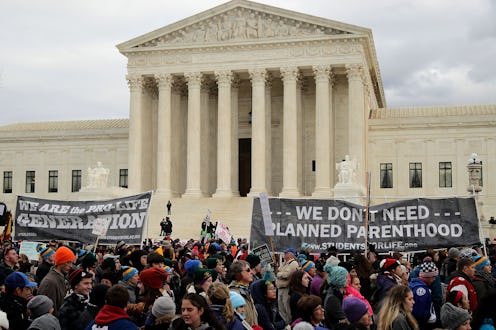News
What You Need To Know About This Crucial Anti-Abortion Case SCOTUS Is Hearing

In a case that tackles both reproductive and First Amendment rights, National Institute of Family and Life Advocates v. Becerra (NIFLA v. Becerra) is the first time the Supreme Court will hear an abortion case under the Trump administration, NBC News reported. The court will decide whether or not some women's health clinics, known as "crisis pregnancy centers," are legally allowed to withhold certain information from patients, particularly concerning abortion and birth control.
The case is between anti-abortion organization NIFLA, which "exists to protect life-affirming pregnancy centers that empower abortion-vulnerable women and families to choose life for their unborn children," according to its site, and Attorney General of California Xavier Becerra.
Becerra is defending the state's Freedom, Accountability, Comprehensive Care and Transparency Act (FACT Act), which requires that all licensed health care centers distribute or display information about state-run reproductive services, including abortion. It also requires unlicensed clinics to state clearly in their advertising that they are not licensed by the state and cannot provide medical services.
Anti-abortion organizations like Americans United For Life feel that the FACT Act is forcing faith-based clinics to "use their walls to promote abortion," the group tweeted.
According to NBC News, past precedent indicates that a state's right to protect the health of its citizens should override an organization's desire to omit information on certain health care services. However, if the anti-abortion organization wins, it could mean major repercussions for women in the United States.
While some of these "crisis centers" — which are ran mostly by religious non-profits that are anti-abortion — are registered medical facilities, some are not, and have no medical professionals on staff, HuffPost reported. In 2013, there were about 2,500 of these centers around the country. NIFLA represents 1,400.
After the FACT Act was passed, two anti-abortion clinics sued then-California Attorney General Kamala Harris, one of the sponsors of the law, The Sacramento Bee reported. In their lawsuit, they claimed the FACT Act violates their freedom of speech and "unconstitutionally compels [the clinics] to speak messages that they have not chosen, with which they do not agree, and that distract, and detract from, the messages they have chosen to speak."
These crisis facilities will often open in the vicinity of actual women's health clinics, in order to intercept or confuse patients who are seeking certain reproductive services, including abortion, birth control, and prenatal care. For instance, one such crisis facility, the Center for Pregnancy Choices, opened up directly across the street from Mississippi's only remaining women's clinic, the Jackson's Women's Health Organization.
On Tuesday, when oral arguments for NIFLA v. Becerra began, pro-choice groups came out to counter-protest anti-abortion demonstrators outside the Supreme Court in Washington D.C. "Freezing rain and wind can’t stop us from rallying to #EndTheLies about fake women’s health centers that intentionally deceive women during pregnancy," the National Asian Pacific American Women's Forum tweeted.
Since this marks the first abortion-related case under the Trump administration, it's also the first time newly appointed Supreme Court Justice Neil Gorsuch, who has a history of ruling in favor of anti-abortion groups, will oversee such a case.
When Gorusch was first nominated by Trump for the open seat, the National Abortion Rights Action League (NARAL) released a statement to warn constituents about the impact Gorsuch's conservative views could have on reproductive rights for women in America.
“With Judge Neil Gorsuch, the stakes couldn’t be higher when it comes to women and our lives," NARAL wrote. "Gorsuch represents an existential threat to legal abortion in the United States and must never wear the robes of a Supreme Court justice."
Should NIFLA win this case, California will no longer be able to enforce the FACT Act. If the group loses, other states could pass similar laws to California's, requiring religious-backed organizations provide all available resources to patients. The ruling is expected no later than this summer.